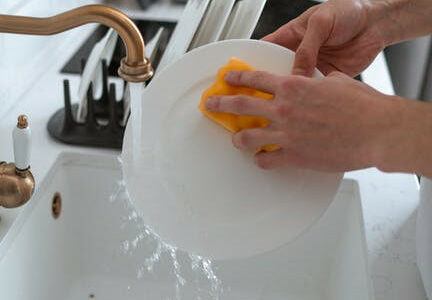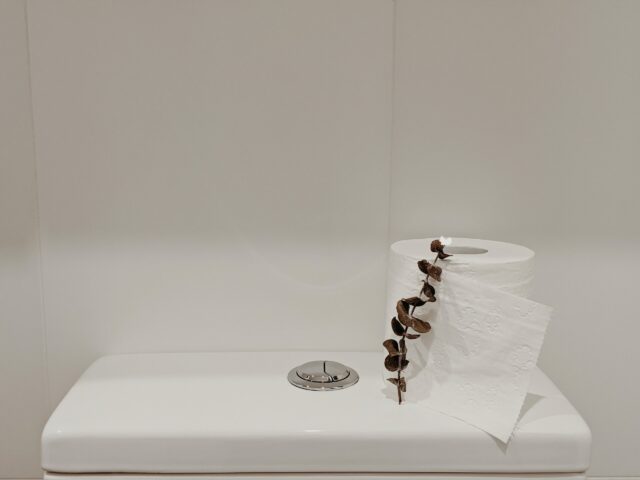We Research, Review And Recommend The Best Products – As an Amazon Associate we earn from qualifying purchases.
Updated May 22, 2022
After cooking and a long bout of dish cleaning, a kitchen Sink Drain can inevitably collect a lot of gunk and debris. A combination of grease, oil, food scraps, and other excess particles is ideal for attracting bacteria and foul smells. It can also lead to a major clog, with water pooling every time you run the faucet.
When a putrid smell is wafting from the drain, everyone wants to dodge the kitchen. It depletes appetites and makes guests run in the opposite direction!
In this article, we’ll outline some of the best ways that can teach you how to clean smelly sink drains, in your kitchen and any other sink around your house such as laundry room and toilets.
For best results in your kitchen sink, make sure to clean the drain monthly to decrease the chance of any plumbing issues. Cleaning weekly can also make sure that the fresh, sanitized smell lasts a little longer.
RELATED = = = > How to Clean a Sink Drain Stopper
How Do I Get Rid Of The Smell In My Sink Drain?
Below, find some of our researched ways to best clean your smelly drain:
Method 1: Boiling Water
This method is the easiest and most efficient way to break through debris and combat smells from the kitchen drain. All you’ll need is a pot, a stove, and water.
Place your pot on the stove, fill it with water, and bring it to a rolling boil. If standing water has accumulated in the sink, you might need to remove as much of the water as possible by using a cup or bowl to scoop it out as best as you can. Once the water on the stove is boiling, pour it down the drain. Repeat the process until the water is free flowing down the drain again.
RELATED = = = > The Best Way to Clean Toilets
Method 2: Baking Soda and Vinegar
One of the most popular tricks for cleaning a smelly drain is to use baking soda, vinegar, and hot water. This natural process can be easy as you likely have all the supplies in your kitchen cabinets.
First, boil two cups of water over the stove. Next, prepare one cup of baking soda, and heat one cup of vinegar in the microwave. Pour the boiling water down the drain, followed by the baking soda, and lastly, the warm cup of vinegar. Cover the drain, and let the solution sit for roughly 10 minutes. Boil another two cups of water on the stove, and after 10 minutes, pour the extremely hot water down the drain to flush out any remaining chunks and stench.
Make sure to repeat the steps as necessary. This tried and true method is sure to get rid of any tricky drain clogs and smells.
Method 3: Salt, Baking Soda, and Vinegar
Adding salt into the mix can help get rid of even tougher clogs and smells. The fine grains of salt can dislodge food and grease and are great for absorbing nasty smells.
To get started, prepare:
- 1/4 cup of salt
- 1/2 cup baking soda
- 1/2 cup vinegar
First, mix the salt with the baking soda, and pour it down the drain. Heat the 1/2 cup of vinegar for a short period of time in the microwave and pour this down the drain next. Once you hear fizzing, cover the drain and let the combination sit for approximately 15 minutes. After said time, boil up the water and pour it down the drain for 30 to 60 seconds.
If necessary, repeat the process. This natural method is a quick and effective way to get rid of offensive odors and difficult clogs.
Method 4: Dish Detergent and Boiling Water
Dish soap and hot or boiling water can be a quick and easy way to get rid of harsh smells and drain buildup.
First, boil water in a pot on the stove. Pour the boiling water down the drain to begin softening some of the grime and gunk. Follow this with some grease-attacking dish soap, such as Palmolive Oxi Power Degreaser (View on Amazon) to further eat away at the clog and give your drain a fresh and clean smell. Continue to boil water and wash through with dish soap until the drain is clear, and your kitchen smells great again.
Method 5: Store-Bought Chemical Cleaners
When dealing with a stubborn clog and an abrasive smell, sometimes the best option is to go to the store and find a heavy-duty chemical cleaner.
For these methods, you should always use caution, as chemicals contain toxic ingredients that can damage your skin, discolor your sink, or damage pipes. For the most protection, always wear rubber gloves, and only use the chemical cleaner’s suggested amount for kitchen sinks found on the bottle’s instructions.
Pour the correct suggested amount down your kitchen sink and let sit for the recommended amount of time from the bottle’s instructions. If your drain is having extensive problems, make sure to contact a plumber.
Method 6: Borax and Boiling Water
Borax is another store-bought option that is much gentler yet just as effective as other chemical cleaners.
First, boil around two cups of water on the stove. Next, use a funnel to pour roughly 1/3 of Borax into the drain. Boil some more water on the stove, pour it down the drain after the Borax. Let the mixture stand in the drain for around 15 to 20 minutes as it disintegrates and eats away at grime and leftover food scraps. Once 15 to 20 minutes has gone by, flush the remains down with hot water from the faucet.
Repeat this process until the water is running down smoothly and your drain is back to a neutral and clean scent.
Method 7: A Natural Way to Get Back to a Fresh Smell
Citrus peels from fruit such as lemons and oranges are a great hack to get a fresh and clean smell.
If you have a garbage disposal, first turn it on and run some water for a few seconds to make sure that everything is flushed down. Next, slice off some peels from the orange or lemon, and run them through the disposal. With a bit of cold water, turn on the disposal with the peels for a short time. Clear the drain line with more running water, and voila! Your drain should have a natural and clean fragrance.
For consistent, clean smells and an unclogged drain, make sure to use some of these techniques on a regular basis. Whether using natural or store-bought ingredients, cleaning out your kitchen drain continually will be the best way to prevent major backups and avoids the need to pay a plumber in the worst-case scenario.
READ ME NEXT = = = >
Should You Turn The Off Water to Change Your Shower Head?
How To Protect Top Of Washer And Dryer From Scratches?
The Best 6 Best Laundry Hampers Of 2022
Did you find this post helpful? Have any questions on it? feel free to comment below:













